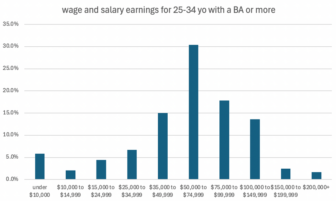The following press release was issued in conjunction with the Michigan Future annual update which took place on Oct. 17 at 3 p.m. at the Detroit Regional Chamber offices. Please contact David Waymire with questions, 517-290-3610.
New report finds most prosperous states focus on high-education jobs, which hold key for Michigan’s economic rebound
Michigan’s economy continues to founder because it remains primarily a factory-based economy that has not taken important steps aimed at increasing the proportion of college graduates living in the state, a new report by Michigan Future, Inc. shows.
The 2011 progress report on Michigan’s transition to a new economy, issued this week by Michigan Future and available at www.michiganfuture.org, also reports that since the start of the Great Recession job losses in low-education sectors (manufacturing, construction, retail, hospitality and temporary services) have accelerated around the nation and in Michigan, further proving the need for Michigan to focus more attention on preparing, attracting and retaining the talent that high education industries require.
Nationally since the start of the Great Recession in December 2007 through May 2011, 7 million jobs have been lost, 6.4 million of them in the low education attainment sectors. The high education attainment sectors – primarily health care, education, professional and technical services, information, financial services and insurance – have held nearly constant, losing just 546,000 jobs. Approximately 9 percent of the low-education industry positions have been eliminated compared to 1 percent of positions in high-education attainment sectors.
“What we found is stunning. The trends we have written about in past reports have accelerated,” said Glazer, president of Michigan Future, who conducted the study with Donald Grimes, Senior Research Specialist at the Institute for Research on Labor, Employment and the Economy at the University of Michigan. “It’s even more apparent now than before: What made Michigan prosperous in the past is no longer our path to prosperity. We will not prosper by chasing low education jobs. This is an inescapable truth.”
This contrasting fortune of high education attainment vs. low education attainment sectors is part of a two decade long trend. Since 1990 high education attainment industries have experienced job growth of 36 percent compared to 7 percent in the rest of the economy.
Glazer and Grimes show Michigan and its largest metropolitan areas are lagging in the transition to a knowledge-based economy. In 2009, Michigan ranked 37th in per capita income, an unprecedented drop of 19 places in a relatively short nine-year period but in line with its position as 36th in college attainment. Michigan also ranked 30th in the share of wages from knowledge- based industries.
“Metro Detroit ranked 41st in per capita income of the 55 metropolitan areas with populations of one million or more, 31st in knowledge-based industries concentration and 39th in college attainment,” Grimes said. “Metro Grand Rapids was even further behind, ranking 54th in per capita income, 54th in knowledge- based industries concentration and 44th in college attainment,” the report says.
“Unless we substantially increase the proportion of college-educated adults, especially in our biggest metropolitan areas, Michigan will continue to be a low-prosperity state.”
New data shows earnings from private sector employment highest in high education states
New in this report is data on the components that make up per capita income for the nation, states and big metros.
Nationally employment earnings account for 72 percent of the country’s personal income. Non-natural resources private sector employment earnings are 58 percent of personal income. Transfer payments are nearly 18 percent. If you combine transfer payments and government employment earnings, you find that 31 percent of national personal income comes from government revenue.
The top 10 states in earnings attributable to non-natural resources private sector per capita (taking out the non-natural resource jobs reduces the impact of the oil and grain economy on certain states) were Connecticut, Massachusetts, New York, New Jersey, Minnesota, Delaware, Illinois, New Hampshire, Colorado and California. Except for Delaware, all of the top ten states are also high college attainment states.
The bottom 10 states in that category were, from the very bottom and moving up, Mississippi, West Virginia, New Mexico, Arkansas, Idaho, South Carolina, Montana, Kentucky, Alabama and Oklahoma. The report notes that all of those states except Montana have very low percentages of their population with college degrees.
As should be expected given Michigan’s relatively low education attainment status, our state looks more like the bottom 10 than the top 10. Employment earnings account for 70 percent of Michigan’s personal income. Non-natural resources private sector employment earnings are 57 percent of the state’s personal income. Transfer payments are more than 22 percent. And if you combine transfer payments and government employment earnings, nearly 34 percent of Michigan’s personal income comes from government revenue.
The report highlights data on non-natural resources private employment earnings. It is an essential ingredient in any state or region being prosperous in the long term, and it is what policymakers at the state and local level are primarily focused on when they put forward economic development policy and programs.
“There are two clear messages from the data,” said Glazer. “First, for Michigan to return to prosperity it must focus on accelerating employment earnings, particularly from the private sector. And secondly, to accomplish that the key ingredient is talent. Quite simply, in a flattening world, economic development priority one is to prepare, retain and attract talent.”
These findings reinforce the action agenda laid out in the New Agenda report:
• Build a culture aligned with (rather than resisting) the realities of a flattening world. We need to place far higher value on learning, an entrepreneurial spirit and being welcoming to all.
• Creating places where talent – particularly mobile young talent – wants to live. This means expanded public investments in quality of place with an emphasis on vibrant central city neighborhoods.
• Ensuring the long-term success of a vibrant and agile higher-education system. This requires a renewed commitment to public investments in higher education – particularly the major research universities.
• Transforming teaching and learning so that it is aligned with the realities of a flattening world.
• Developing new private and public sector leadership that has moved beyond both a desire to recreate the old economy as well as the old fights. Michigan needs leadership that is clearly focused, at both the state and regional level, on preparing, retaining and attracting talent.
For a copy of the report and more on Michigan Future Inc., visit www.michiganfuture.org.
Below are edited versions of Tables 13 and 14 in the report.
| Top 10 in Non-Natural Resources Private Sector Earnings | Non-Nat Resources
Earnings |
Share of Personal Income | Govt. Earnings &
Transfers Share of PI |
| Connecticut | $33,070 | 59.8% | 24.9% |
| Massachusetts | $32,957 | 66.4% | 25.6% |
| New York | $29,479 | 63.4% | 31.2% |
| New Jersey | $28,554 | 57.1% | 26.1% |
| Minnesota | $26,029 | 62.2% | 27.6% |
| Delaware | $25,792 | 65.1% | 31.8% |
| Illinois | $25,789 | 61.6% | 26.8% |
| New Hampshire | $25,546 | 59.9% | 24.3% |
| Colorado | $25,515 | 60.9% | 25.8% |
| California | $24,795 | 58.5% | 28.3% |
| United States | $22,758 | 57.4% | 30.8% |
| Michigan | $19,545 | 57.0% | 34.3% |
| Bottom 10 | |||
| Oklahoma | $17,114 | 47.8% | 35.9% |
| Alabama | $17,094 | 51.2% | 38.1% |
| Kentucky | $17,092 | 53.0% | 39.9% |
| Montana | $16,663 | 47.8% | 35.4% |
| South Carolina | $16,599 | 51.1% | 38.6% |
| Idaho | $16,397 | 51.5% | 32.3% |
| Arkansas | $16,308 | 50.5% | 37.6% |
| New Mexico | $15,367 | 46.2% | 41.2% |
| West Virginia | $14,450 | 45.0% | 42.6% |
| Mississippi | $14,012 | 46.1% | 42.3% |






